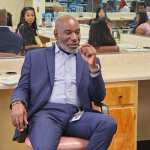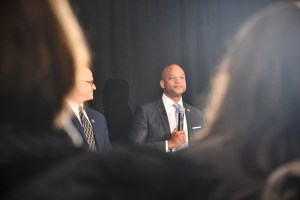By Deborah Bailey
AFRO Contributing Editor
dbailey@afro.com
The U.S. Africa Collaborative recently held the 2024 Pan African City Exposition on the campus of Bowie State University. The international affordable housing symposium offered an exchange of ideas in search of solutions to the affordable housing crisis across the African Diaspora, with emphasis on Africa, the United States (U.S.) and the United Kingdom (UK).

The Collaborative, organized by Maryland native and international housing advocate, Elizabeth Glenn, connects affordable housing advocates across the African Diaspora, from government officials, universities, nonprofits and community-based voices. Glenn, former deputy director of Baltimore County’s Department of Planning has worked on affordable housing issues in Ecuador, Türkiye, South Africa, Australia as well as the U.S.
“We operate based on the African Proverb that says ‘if you want to go fast, go alone. If you want to go far, go together.’ We are going together, and we are trying one step at a time to build bridges across the diaspora,” Glenn said. “The African Diaspora got spread out across the globe. We got disconnected from our past, but it doesn’t mean we have to be disconnected in our future.”
Glenn and symposium conveners presented a balance between U.S. housing issues and equity and solutions to the world-wide crisis in sustainable, affordable housing. Both Adrienne Todman, secretary of the U.S. Department of Housing and Urban Development and Dr. Nana Mhlongo, deputy director-general of South Africa’s National Department of Human Settlements, addressed the audience and spoke to the deficit in housing for low wealth citizens and the need for innovative solutions.
The U.S. currently has a 7.3-million affordable housing unit shortage, according to the National Low Income Housing Coalition. The backlog of South Africa’s government subsidized settlements is 2.4 million, according to the country’s International Trade Administration. Both countries also face a growing homeless population.

Sanele Mbambo, lecturer at South Africa’s University of the Free State, has been involved with the U.S. Africa Collaborative since the symposium first convened in South Africa in 2022. He came to Maryland to learn how the U.S. tackles its legacy of housing discrimination.
“The United States has a common case with South Africa in terms of racial discrimination. I am quite impressed with how many American organizations and institutions are managing the development of human settlements,” said Mbambo, regarding the 5.2 million U.S. households receiving subsidized housing assistance.
Ayanna Nahmias, founder of Africa Vertical, offered rural solutions for economic empowerment through the farming project she oversees in Zimbabwe. The 200 women connected with Africa Vertical’s sustainable, organic farm, grow food that feeds communities. The farm not only provides the women skills in agriculture, but also supports them in a livelihood through the micro business they operate selling the produce they harvest.
Nahmias, who lives between Northern Virginia and Zimbabwe, first moved to Africa as a child with her parents. She considers herself a “daughter of Africa,” and began the farm in 2015 after her father’s death in Zimbabwe.
“The Africa vertical farm in Zimbabwe is an alternative to donor dependency,” Nahmias said. “The women involved with the farm are able to grow organic food, feed their families and community, and make a living.”
Nahmias is currently implementing a hydroponic farming model and seeking other countries, including the U.S. where her Zimbabwean farming model can be replicated.
A Pan African housing symposium wouldn’t be complete without song, dance and Capoeira de Angola, a form of Afro-Brazilian martial arts. Jonal Lartique, from Richmond, and Troy Thomas, based in metropolitan D.C, taught participants about the highly stylized and rhythmic martial arts form that looks like a choreographed dance.
“This art form is part of the traditional practice that came with us when we came to America,” Lartique said, adding that the demonstration visualized the data and information shared in the symposium workshops. “The healing is in each of us, coming together, working out our past and working toward our future.”
The post U.S. Africa Collaborative Housing Exposition offers solutions to global affordable housing crisis appeared first on AFRO American Newspapers.










